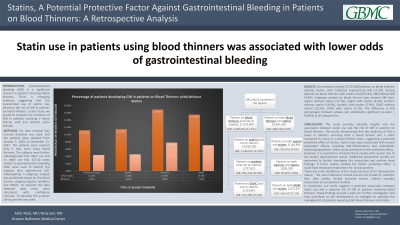Monday Poster Session
Category: GI Bleeding
P2025 - Statins - A Potential Protective Factor Against Gastrointestinal Bleeding in Patients on Blood Thinners: A Retrospective Analysis
Monday, October 23, 2023
10:30 AM - 4:15 PM PT
Location: Exhibit Hall

Has Audio

Azfar Niazi, MD
Greater Baltimore Medical Center
Towson, MD
Presenting Author(s)
Azfar Niazi, MD1, Niraj Jani, MD2
1Greater Baltimore Medical Center, Towson, MD; 2Greater Baltimore Medical Center, Baltimore, MD
Introduction: Gastrointestinal bleeding (GIB) is a significant concern in patients receiving blood thinners. There is emerging evidence suggesting that the concomitant use of statins may influence the risk of GIB in patients on blood thinners. In this study, we aimed to compare the incidence of GIB in patients receiving a blood thinner with and without statin therapy.
Methods: We conducted a retrospective analysis of 190,148,513 patients in the Cosmos electronic database. Patients were categorized based on their use of blood thinners (including aspirin, warfarin, and direct oral anticoagulants [DOACs]) and statins. We collected data on the total number of patients in each category and the number of patients who experienced GIB.
Results: Our analysis involved 17,375,400 patients on blood thinners without statins, with 1,956,553 experiencing GIB (11.2%). Among patients on blood thinners with statins (10,607,434), 468,518 had GIB (4.4%). Subgroup analysis by blood thinner type showed GIB rates: aspirin without statins (11.5%), aspirin with statins (4.6%), warfarin without statins (16.9%), warfarin with statins (7.8%), DOAC without statins (15.5%), DOAC with statins (7.1%). The difference in GIB percentages between groups was statistically significant (p-value < 0.0001) in all comparisons.
Discussion: The study provides valuable insights into the association between statin use and the risk of GIB in patients on blood thinners. The results demonstrate that the incidence of GIB is lower in patients receiving both a blood thinner and a statin compared to those on a blood thinner alone, suggesting a potential protective effect of statins. Statins have been associated with several pleiotropic effects, including anti-inflammatory and endothelial-stabilizing properties, which could contribute to this protective effect.
However, it is essential to interpret these results with caution due to the study’s observational nature. Additional prospective studies are warranted to further investigate this association and confirm these findings. If future studies validate the statins’ protective effect, it could have important implications for clinical practice.
In conclusion, our study suggests a potential association between statin use and a reduced risk of GIB in patients receiving blood thinners. These findings provide a basis for further investigation and may contribute to the development of strategies to optimize the management of patients requiring both blood thinners and statins.
Disclosures:
Azfar Niazi, MD1, Niraj Jani, MD2. P2025 - Statins - A Potential Protective Factor Against Gastrointestinal Bleeding in Patients on Blood Thinners: A Retrospective Analysis, ACG 2023 Annual Scientific Meeting Abstracts. Vancouver, BC, Canada: American College of Gastroenterology.
1Greater Baltimore Medical Center, Towson, MD; 2Greater Baltimore Medical Center, Baltimore, MD
Introduction: Gastrointestinal bleeding (GIB) is a significant concern in patients receiving blood thinners. There is emerging evidence suggesting that the concomitant use of statins may influence the risk of GIB in patients on blood thinners. In this study, we aimed to compare the incidence of GIB in patients receiving a blood thinner with and without statin therapy.
Methods: We conducted a retrospective analysis of 190,148,513 patients in the Cosmos electronic database. Patients were categorized based on their use of blood thinners (including aspirin, warfarin, and direct oral anticoagulants [DOACs]) and statins. We collected data on the total number of patients in each category and the number of patients who experienced GIB.
Results: Our analysis involved 17,375,400 patients on blood thinners without statins, with 1,956,553 experiencing GIB (11.2%). Among patients on blood thinners with statins (10,607,434), 468,518 had GIB (4.4%). Subgroup analysis by blood thinner type showed GIB rates: aspirin without statins (11.5%), aspirin with statins (4.6%), warfarin without statins (16.9%), warfarin with statins (7.8%), DOAC without statins (15.5%), DOAC with statins (7.1%). The difference in GIB percentages between groups was statistically significant (p-value < 0.0001) in all comparisons.
Discussion: The study provides valuable insights into the association between statin use and the risk of GIB in patients on blood thinners. The results demonstrate that the incidence of GIB is lower in patients receiving both a blood thinner and a statin compared to those on a blood thinner alone, suggesting a potential protective effect of statins. Statins have been associated with several pleiotropic effects, including anti-inflammatory and endothelial-stabilizing properties, which could contribute to this protective effect.
However, it is essential to interpret these results with caution due to the study’s observational nature. Additional prospective studies are warranted to further investigate this association and confirm these findings. If future studies validate the statins’ protective effect, it could have important implications for clinical practice.
In conclusion, our study suggests a potential association between statin use and a reduced risk of GIB in patients receiving blood thinners. These findings provide a basis for further investigation and may contribute to the development of strategies to optimize the management of patients requiring both blood thinners and statins.
Disclosures:
Azfar Niazi indicated no relevant financial relationships.
Niraj Jani indicated no relevant financial relationships.
Azfar Niazi, MD1, Niraj Jani, MD2. P2025 - Statins - A Potential Protective Factor Against Gastrointestinal Bleeding in Patients on Blood Thinners: A Retrospective Analysis, ACG 2023 Annual Scientific Meeting Abstracts. Vancouver, BC, Canada: American College of Gastroenterology.
